

Revista Mugak - nº 56 - Etienne Balibar: "La condición de extranjero se define menos por el pasaporte que por el estatus precario" - Mugak. Entrevista de Catherine Portevin y Mathilde Blottière (En Télérama Horizons Abril de 2011) "Cada sociedad fabrica su extranjero y cada una a su manera", escribe el sociólogo inglés Zygmunt Bauman, que a usted le gusta citar.
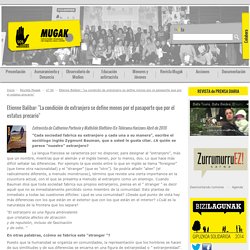
¿A quién se parece "nuestro" extranjero? La lengua francesa se caracteriza por no disponer, para designar al "extranjero", más que un nombre, mientras que el alemán y el inglés tienen, por lo menos, dos. Lo que hace más difícil señalar las diferencias. Por ejemplo la que existe entre lo que en inglés se llama "foreigner" (que tiene otra nacionalidad) y el "stranger" (que es "otro"). La revista cristiana de hoy - Inmigrantes en Ceuta y Melilla: Estado de excepción en la frontera Sur.
Helena Maleno Garzón . 09-01-2014 Según un informe elaborado por organizaciones sociales, que analiza la aplicación en Marruecos de la Convención Internacional sobre la protección de derechos de todos los trabajadores migrantes y los miembros de sus familias (CMW), el acceso a derechos fundamentales de la población migrante se ha deteriorado desde 2011.
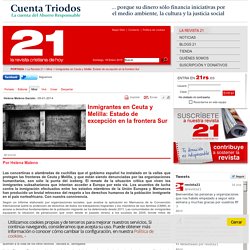
Las comunidades de inmigrantes equiparan la situación de persecución que viven desde el pasado verano a los sucesos de 2005, donde miles de inmigrantes fueron conducidos al desierto y abandonados a su suerte. La situación es especialmente crítica en el Norte de Marruecos, y las asociaciones señalan las zonas fronterizas de Ceuta y Melilla como espacios de extremada violencia. “Entran en las casas de madrugada, golpean con tal fuerza que nos entra el pánico.
Tienes que abrir porque si no pueden romper la puerta y después hay que pagarla al dueño de la casa. “Cuando me detuvieron en Nador les enseñé mi documento de refugiado. The reversibility of the real. All images are born equal today, from family snapshots to works of art, via Hollywood movies.
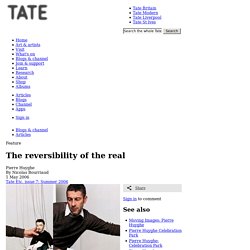
The important thing is that they can be compared – that they can be judged. We can always claim the opposite and think in terms of the medium, or develop a rhetoric of resistance, but that would mean contemporary art finally being reduced to the narrow dimensions of its distribution circuit and institutional apparatus. Let’s say that the forms produced by artists at the beginning of our twenty-first century constitute a kind of wildlife reserve: they evolve a little more freely than the others, even if they are subject to the same economic and idealogical constraints as them.
Pierre Huyghe’s strength lies in his understanding of the fact that an image always comes with baggage. 1. Chantier permanent (A permanent construction site), the title of one of Huyghe’s works, could apply to them all. Manet painted the individual in the urban crowd. 2. Los campos para extranjeros en Europa. La Unión Europea (UE) recalca con razón su apego a los valores de los derechos humanos y al respeto a la libertad en el mundo.
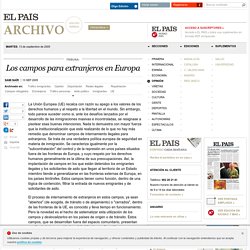
Sin embargo, todo parece suceder como si, ante los desafíos lanzados por el desarrollo de las inmigraciones masivas e incontroladas, se resignase a pisotear esas buenas intenciones. Nada lo demuestra con mayor fuerza que la institucionalización que está realizando de lo que no hay más remedio que denominar campos de internamiento ilegales para extranjeros. 42000A0922(02) The Schengen acquis - Convention implementing the Schengen Agreement of 14 June 1985 between the Governments of the States of the Benelux Economic Union, the Federal Republic of Germany and the French Republic on the gradual abolition of checks at their common borders Official Journal L 239 , 22/09/2000 P. 0019 - 0062 of 14 June 1985 between the Governments of the States of the Benelux Economic Union, the Federal Republic of Germany and the French Republic on the gradual abolition of checks at their common borders The KINGDOM OF BELGIUM, the FEDERAL REPUBLIC OF GERMANY, the FRENCH REPUBLIC, the GRAND DUCHY OF LUXEMBOURG and the KINGDOM OF THE NETHERLANDS, hereinafter referred to as "the Contracting Parties", TAKING as their basis the Schengen Agreement of 14 June 1985 on the gradual abolition of checks at their common borders, WHEREAS the fulfilment of that resolve requires a series of appropriate measures and close cooperation between the Contracting Parties, Article 1 Article 2 1. 2. 3. 4.
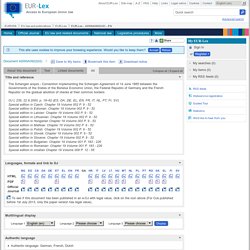
# LEGAL THEORY /// The Law Turned into Walls for Volume 38: The Shape of Law. The thirty-eighth issue of Volume entitled The Shape of Law has been recently released and I have the great chance to have a paper in it, in company of many friends (Daniel Fernandez Pascual, Nina Kolowratnik, Pedro Gadanho, Ethel Baraona Pohl, Brendan Cornier, Cristina Goberna, Urtzi Grau, Dubravka Sekulic and Paula Alvarez).
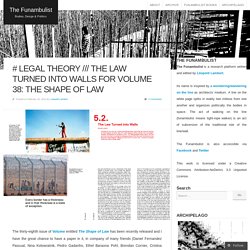
This issue is very useful as an introduction to problems of space in relation to the legal system that produces it. Living on the Electromagnetic Border. A golfer hits a tee shot as African migrants sit atop a border fence during an attempt to cross into Spanish territories between Morocco and Spain’s north African enclave of Melilla, October 22, 2014.
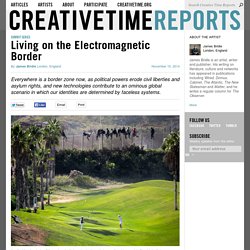
Photo by José Palazon/REUTERS. In 2010 U.S. Customs and Border Protection agents at the Canadian border stopped an American student on his way home to Brooklyn. Pascal Abidor was returning from McGill University in Montreal, where he was working on his Ph.D. Unfortunately for him, his doctorate is in Islamic Studies, and when the officers asked him to open his laptop and type in his password, they found images of Hamas and Hezbollah rallies, collected as part of his research into modern Lebanese Shiism. Some 200 million Americans actually live in de jure border zones, subject to an almost complete exemption from the Fourth Amendment The subsequent court battle, which the ACLU lost, resulted in a ruling with consequences that were literally far-reaching.
Technology itself is never neutral.